As women approach menopause, they may start to notice changes in their bodies. They may have hot flashes, trouble sleeping, and mood swings. While these changes can be challenging, there are things that women can do to help ease symptoms. One option is to take supplements. Supplements can help to regulate hormone levels and ease menopausal symptoms whilst providing your body with key vitamins and minerals that will help support your body as it changes.
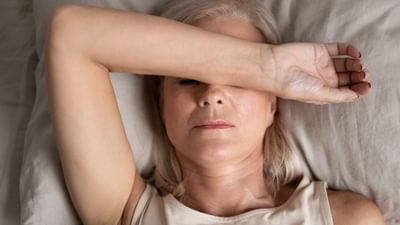
Vegan Tablets and Vitamins for Menopause
Menopause is a transitional time for women and comes with many changes for their bodies and their health. It brings many changes and can be difficult to adjust.
As women approach menopause, they may have hot flashes, trouble sleeping, and mood swings as well as feelings of anxiety, depression and changes to their appearance. While these changes can be challenging, there are things that women can do to help ease symptoms and feel more in control of their bodies.
One way for women to stay on top of their health is to take supplements, keep active and have a healthy diet. There is also some research that indicates a vegan diet can help with menopause symptoms and that following a plant-based diet can support the body through perimenopause and the later stages of menopause.
Vitamins for menopause can also help to regulate hormone levels and ease menopausal symptoms, whilst providing your body with key vitamins and minerals that will help support your body as it changes.
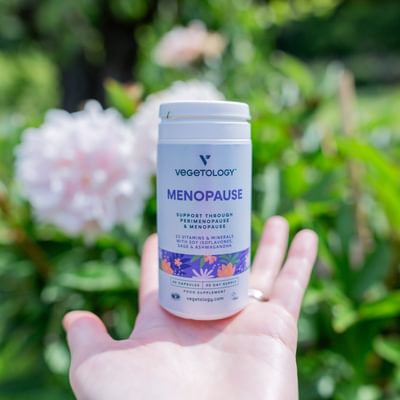
What is menopause?
Officially menopause is the stage in a woman’s life when she stops having periods, and menopause is classed as the time twelve months after her last period. Yet it’s so much more than that.
It can mean huge changes to the body as well as affecting mental and emotional health. It can start as early as 30 years old and can last up into the late 50s. The menopausal transition can include the body beginning to change as the body's production of estrogen and progesterone slows down.
Menopause can also be triggered by a hysterectomy or the surgical removal of the ovaries, which produce hormones. If you have surgery to remove your uterus or ovaries and are not taking hormones, you will experience symptoms of menopause immediately.
What age does menopause happen?
The average age for menopause is 51, yet for many women the symptoms and stages can start earlier. The menopausal transition most often begins between ages 45 and 55. It usually lasts about seven years but can be up to 14 years. The duration can depend on lifestyle factors such as smoking, age it begins, and race and ethnicity.
Whilst it starts later in life, some women begin to experience symptoms as early as their 30s. Menopause can be different for everyone. There is no ‘one size fits all’ for menopause, so often it can be about knowing your body and what works for it.
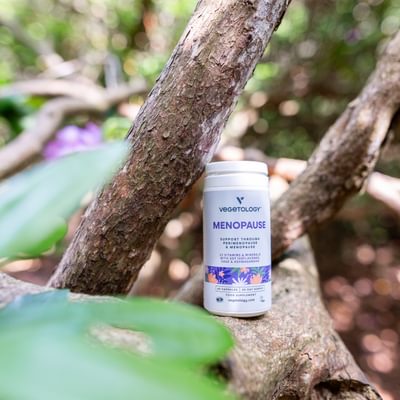
What are the stages of menopause?
Menopause is divided into three basic stages: perimenopause, menopause, and post menopause. During this time, the ovaries begin to atrophy which causes a decline in the production of the hormones that stimulate the menstrual cycle, estrogen and progesterone.
Perimenopause
Perimenopause is when you have symptoms of menopause, but your periods have not stopped. Monthly cycles can begin to slow leading to irregular symptoms as the ovaries gradually stop working. You may start having either unusually light or heavy periods. The frequency of your periods may also be affected. You may have one every two or three weeks, or you may not have one for months at a time.
Perimenopause is a natural process that causes physical and emotional symptoms. It does not need treatment, but treatment can help lessen symptoms. Treatment includes hormones, antidepressants, and lifestyle changes.
Perimenopause is seen to end and you reach menopause when you have not had a period for 12 months.
Menopause
Menopause is the time that marks the end of your menstrual cycles. It's diagnosed after you've gone 12 months without a menstrual period. Menopause is defined as the absence of menses for 12 straight months without other causes, such as illness, medication or pregnancy. Once you reach menopause, you can no longer achieve pregnancy.
The average age of menopause is 51, but the age can vary greatly. Some enter this stage in their mid-forties and others not until mid-fifties.
Post menopause
Post menopause is the time after menopause, when a woman hasn't experienced a period for over a year. Post menopause, you will no longer have periods, but some women do continue to experience symptoms of menopause.
Once you enter post menopause, you're in this stage for the rest of your life. Your hormone levels will remain low, and you'll no longer have a monthly period.
What are the symptoms of menopause?
Menopause is often defined by how it makes you feel, as the symptoms can be difficult to manage and feel overwhelming at times. Symptoms can last for several years, and even up to 14 years in some cases. Some women report seeing some of these symptoms as early as 30, but not experiencing full menopause until much later in life.
The symptoms of menopause can hugely vary from person to person and there is no ‘one size fits all’ approach.
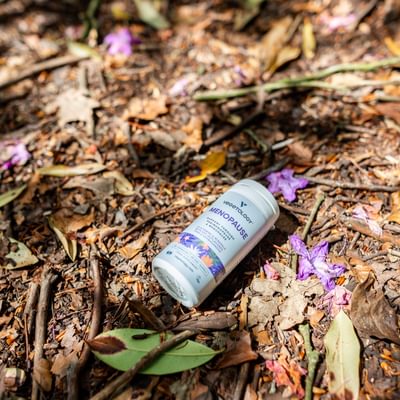
Symptoms can include:
If you are concerned about any of these symptoms, then seek help or advice from your doctor. Your doctor can advise on treatments and any support you might need during menopause.
What treatment is there for menopause?
Hormone Replacement Therapy (HRT) is a commonly offered treatment used to relieve symptoms of the menopause. It replaces the female hormones that are at a lower level as you experience the menopause.
There are different types and doses of HRT. One form prescribed is because you may need more oestrogen. Oestrogen comes as skin patches, a gel or spray to put on the skin, implants and tablets.
If you still have a uterus then you might be prescribed progesterone alongside the oestrogen, which is called combined HRT. Progesterone comes as patches, as part of a combined patch with oestrogen. It also comes as IUS (intrauterine system, or coil) and tablets.
If you have a low sex drive because of menopause and HRT does not improve it, you may be offered testosterone. Testosterone is produced by the ovaries and your levels usually get lower with age. As a menopause treatment it isn’t currently offered to women, but it can be prescribed after the menopause by a specialist doctor if they think it might help restore your sex drive. This can also be used alongside HRT.
There are also alternative and natural remedies offered to help with menopause. These aren’t as widely proven, but some people find they help lessen symptoms. However, it’s important to be aware of how any natural remedies or natural hormones (also called compounded bioidentical) can have side effects when used alongside other medicines.
What vitamins do you need during menopause?
Maintaining a healthy diet and lifestyle during menopause can help in this transitional time. Ensuring the body has enough nutrients and vitamins is essential as the body undergoes change and development. Hormone imbalances and being deficient in diet can all have an effect on symptoms, so upping our vitamin and nutrient intake can have huge benefits.
Vitamins that can help through menopause include:
Often there are blends of these vitamins for women that can help
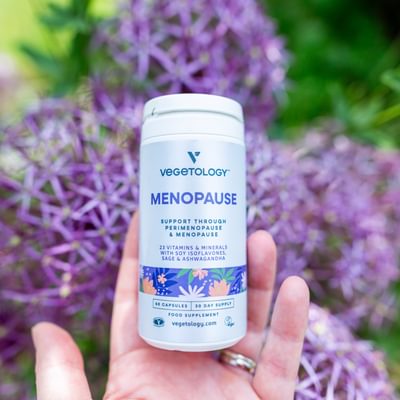
with the symptoms of menopause as well as looking after their health. Looking after our health and vitamin intake can support sleep, mood and ease fatigue.
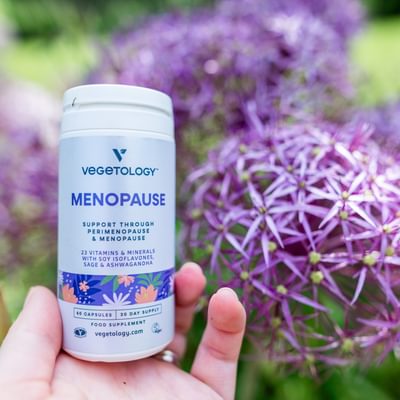
Are there supplements for menopause?
Menopause symptoms are caused by a combination of hormone imbalance and, in many cases, vitamin or mineral deficiency. Supplements will only help improve the menopause symptoms caused by dietary imbalance and won't help improve any symptoms caused by hormonal changes.
Supplements can help to regulate hormone levels and ease menopausal symptoms whilst providing your body with key vitamins and minerals that will help support your body as it changes.
Whilst we can often get many vitamins and nutrients from our diets, it can be helpful to boost our vitamin intake.
How can you look after your body during menopause?
At this time in life menopause can feel overwhelming, but there are ways to look after bodies and feel more in control of symptoms.
There are a few ways to look after our bodies through this change, which includes wearing light clothing and avoiding triggers such as spicy food, caffeine, hot drinks, smoking and alcohol.
Reducing stress levels will also help with mood and anxiety, which can be heightened during menopause.
Exercising regularly is also helpful in menopause. Advice suggests you should aim for two hours and 30 minutes of moderate aerobic activity each week. This can be broken down as 30 minutes of exercise across five days. Other exercise and mindfulness including deep breathing, yoga, and stretching exercises can help to manage the stress of life and menopause-related symptoms.
If you are overweight, then losing weight can ease symptoms. Research showed the severity of menopausal symptoms has been higher among obese women compared to those that weigh less. Those that lost weight and weren’t classed as obese saw an improvement in their menopausal symptoms, especially hot flashes, mood disorders, and sleep disturbances.
